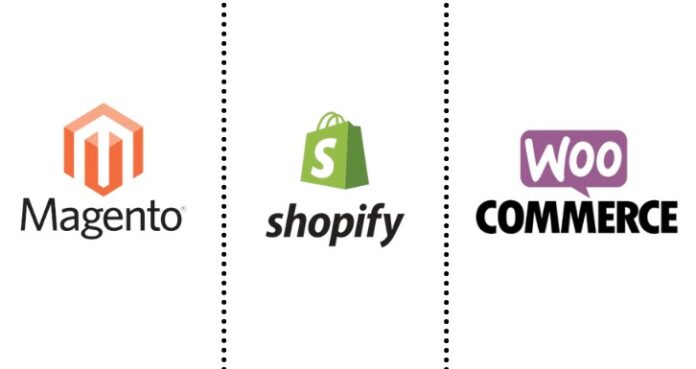The e-commerce world has transformed how businesses operate, providing them with a global platform to reach customers far and wide. Choosing the right e-commerce platform in us is crucial for the success of any online business. In this article, we will explore some of the leading e-commerce platforms, highlighting their pros, cons, and key features to help you make an informed decision.
Shopify
Pros:
- User-Friendly Interface: Shopify is known for its intuitive and easy-to-use interface, making it accessible even for those without technical expertise.
- Variety of Themes: Offers a wide range of professionally designed themes that are mobile-responsive and customizable.
- App Store: Extensive app store with over 4,000 apps to enhance functionality, including marketing tools, inventory management, and customer service apps.
- 24/7 Support: Provides round-the-clock customer support via chat, email, and phone.
Cons:
- Transaction Fees: You need to use Shopify Payments to avoid transaction fees adding up.
- Limited Customization: For advanced customization, you might need to hire a developer.
Key Features:
- Abandoned Cart Recovery: Automatically sends emails to customers who leave items in their cart.
- Multi-Channel Selling: Integrates with various platforms like Amazon, eBay, and social media channels.
- SEO Tools: Built-in SEO features to help your store rank higher in search engine results.
WooCommerce
Pros:
- Flexibility: Being a WordPress plugin, WooCommerce offers extensive flexibility and customization options.
- Large Community: A vast community of developers and users means plenty of resources and support.
- No Transaction Fees: Unlike many other platforms, WooCommerce does not charge transaction fees.
- Open Source: Free to use with a wide range of free and premium extensions.
Cons:
- Hosting Costs: You need to manage your own hosting, which can incur additional costs.
- Steeper Learning Curve: Requires more technical knowledge compared to some other platforms.
Key Features:
- Product Management: Supports unlimited products, variations, and inventory management.
- Payment Gateways: Supports various payment gateways, including PayPal and Stripe.
- Extensive Plugins: Thousands of plugins available to enhance functionality, from SEO to marketing tools.
BigCommerce
Pros:
- Scalability: Excellent for businesses looking to scale, with robust built-in features.
- No Transaction Fees: Does not charge transaction fees on any of its plans.
- Multi-Channel Integration: Seamlessly integrates with platforms like Amazon, eBay, and Google Shopping.
- Built-In SEO: Strong SEO capabilities to help your products rank higher.
Cons:
- Complex Interface: Can be overwhelming for beginners due to its extensive features.
- Limited Free Themes: Offers fewer free themes compared to some competitors.
Key Features:
- Page Builder: Drag-and-drop page builder for easy customization without coding.
- Advanced Analytics: Detailed analytics and reporting tools to monitor your store’s performance.
- B2B Functionality: Advanced B2B features such as customer groups and price lists.
Magento
Pros:
- Highly Customizable: Provides unparalleled customization options for those with coding skills.
- Scalable: Suitable for businesses of all sizes, from small startups to large enterprises.
- Robust Feature Set: Extensive out-of-the-box features tailored for complex business needs.
- Strong Community: A large and active community for support and resources.
Cons:
- Technical Expertise Required: Not suitable for beginners; requires significant technical knowledge.
- High Costs: Can be expensive due to hosting, development, and maintenance costs.
Key Features:
- Advanced SEO: Comprehensive SEO capabilities to improve search engine rankings.
- Marketing Tools: Built-in marketing tools including promotions, coupons, and email marketing software.
- Product Management: Supports complex product catalogues with advanced inventory management.
Squarespace
Pros:
- Beautiful Templates: Known for its stunning, professionally designed templates.
- Ease of Use: User-friendly interface suitable for beginners.
- All-in-One Solution: Provides hosting, domain registration, and e-commerce tools in one package.
- 24/7 Customer Support: Reliable customer support via chat and email.
Cons:
- Limited Customization: Offers less flexibility compared to platforms like WooCommerce or Magento.
- Transaction Fees: Charges transaction fees unless on the highest plan.
Key Features:
- Integrated Blogging: Powerful blogging platform to complement your online store.
- SEO Tools: Built-in SEO features to help your site rank better.
- Mobile-Optimized: All templates are mobile-responsive, ensuring a good user experience on all devices.
Wix eCommerce
Pros:
- Ease of Use: Drag-and-drop builder makes it easy to set up and customize your store.
- Affordable: Competitive pricing plans suitable for small businesses.
- App Market: Offers a variety of apps to extend the functionality of your store.
- Customer Support: Provides 24/7 customer support via phone and email.
Cons:
- Limited Scalability: May not be suitable for very large or rapidly growing businesses.
- Transaction Fees: Charges transaction fees on top of payment gateway fees.
Key Features:
- Design Flexibility: Hundreds of customizable templates to choose from.
- SEO Tools: SEO Wiz tool to help improve your search engine rankings.
- Integrated Marketing: Email marketing, social media tools, and ad integration.
- Workforce Management: Easily integrate with workforce scheduling software to manage employee shifts and schedules.
Choosing the right e-commerce platform depends on your specific business needs, technical expertise, and budget. Shopify and BigCommerce are great for businesses looking for an all-in-one, scalable solution. WooCommerce offers flexibility and customization for those who are comfortable with WordPress. Magento provides robust features for larger enterprises with technical resources. Squarespace and Wix are excellent for beginners and small businesses looking for ease of use and beautiful design.
By understanding the pros, cons, and key features of each platform, you can make a well-informed decision that will set your online store up for success.




